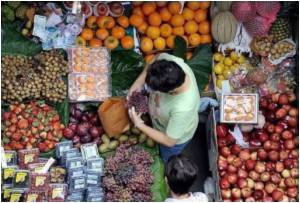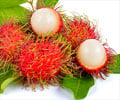It's smaller than a kumquat -- about the size of your thumb -- and smooth-skinned like a tomato. But this rare fruit flourishing in orchards by the Adour river in southwest France

"Until you cut it in half, you don't know it's a kiwi," said Fabien Bec, manager of new product development for the SOFRUILEG kiwi co-operative, which owns the European distribution rights to the plant.
Recently given an award for innovation by SIFEL, the international fruit and vegetable trade show, the co-op plans to expand its mini-kiwi orchards from seven to 500 hectares (1,235 acres) by 2016, aiming to produce 10,000 tonnes.
Its 250 farmers already produce 13,000 tonnes of regular kiwis in France.
But their plans for the delicious miniature fruits extend beyond France, the world's fifth largest producer of kiwis. Orchards are also planned for the Netherlands, southwest England and northern Portugal.
"In Europe, we have different climates that will keep the fruit in the market longer," said Bec, noting that supermarkets require a sufficient supply to effectively launch a new product.
Advertisement
In addition to European customers, the co-op expects increasing exports to Asia, Russia and South America.
Advertisement
Not only will the mini-kiwi broaden the co-op's business plan, but initial market studies have shown that the little fruits, sweeter than regular kiwis, will widen the horizon for the kiwi itself, attracting different consumers and consumption habits than their larger cousins.
"It's the people who buy raspberries and other berries. It's a snacking product. It's also a different pricing bracket, which is interesting for us," said Bec.
Packaged in the same flat, plastic baskets as blueberries and raspberries, mini-kiwis in a 125-gramme (4.5 ounce) container will sell for between two and three euros (2.20 to 4.10 dollars).
But the peel raises questions for the consumer. If it doesn't have a brown fuzzy peel, is it really a kiwi? Bec insists it is.
"This is not a genetically-modified organism. This is natural. It's always existed," said Bec, explaining that the wild varieties of mini kiwis weren't viable commercially.
"We liked the sweeter taste, but there were too many fruits on each cluster, it took too long to pick, and the fruit was difficult to package, too fragile and quickly perishable. That was 25 years ago," he added.
"It was very frustrating because we knew we had a fruit that was so good."
This new variety, Actinidia arguta, developed by the Plant and Food Research centre in New Zealand, overcomes those obstacles with fewer, more-attractive fruit on the cluster and a longer shelf life of 45-90 days.
It is not as hardy as its furry cousin, which stays fresh for up to six months, but it outlasts berries and can be popped in the mouth just like a berry. "In the world of berries, it's an interesting product," said Bec.
And the growers say it improves the economic and environmental sustainability of farming in the region.
The co-op's farmers typically raise ducks and grow corn as well as kiwis. Apples were also a mainstay but the market dropped out, prompting farmers like Jean-Louis Tissier, owner of Verger de l'Hermitage, to plant mini-kiwis instead.
"It's new, we'll give it a try. You rarely have to treat the mini-kiwis, so they're already better than apples," said Tissier, as he walked through his young orchard.
As for the other kiwis in the region, "we do not use insecticides or fungicides, which is good for a fruit that you will not peel," said Bec.
Some farmers have already said they will grow fully organic mini-kiwis.
The mini-kiwis will be on display and available for tasting at the trade show VINITECH-SIFEL, running from November 30 to December 2 in Bordeaux, France.
Source-AFP












